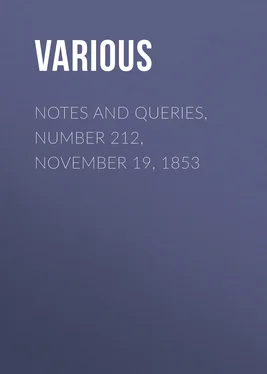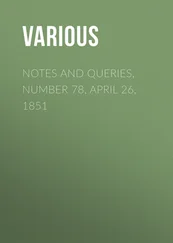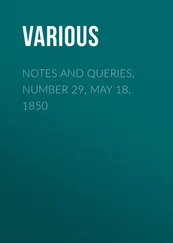Various - Notes and Queries, Number 212, November 19, 1853
Здесь есть возможность читать онлайн «Various - Notes and Queries, Number 212, November 19, 1853» — ознакомительный отрывок электронной книги совершенно бесплатно, а после прочтения отрывка купить полную версию. В некоторых случаях можно слушать аудио, скачать через торрент в формате fb2 и присутствует краткое содержание. Жанр: foreign_antique, periodic, foreign_edu, на английском языке. Описание произведения, (предисловие) а так же отзывы посетителей доступны на портале библиотеки ЛибКат.
- Название:Notes and Queries, Number 212, November 19, 1853
- Автор:
- Жанр:
- Год:неизвестен
- ISBN:нет данных
- Рейтинг книги:4 / 5. Голосов: 1
-
Избранное:Добавить в избранное
- Отзывы:
-
Ваша оценка:
- 80
- 1
- 2
- 3
- 4
- 5
Notes and Queries, Number 212, November 19, 1853: краткое содержание, описание и аннотация
Предлагаем к чтению аннотацию, описание, краткое содержание или предисловие (зависит от того, что написал сам автор книги «Notes and Queries, Number 212, November 19, 1853»). Если вы не нашли необходимую информацию о книге — напишите в комментариях, мы постараемся отыскать её.
Notes and Queries, Number 212, November 19, 1853 — читать онлайн ознакомительный отрывок
Ниже представлен текст книги, разбитый по страницам. Система сохранения места последней прочитанной страницы, позволяет с удобством читать онлайн бесплатно книгу «Notes and Queries, Number 212, November 19, 1853», без необходимости каждый раз заново искать на чём Вы остановились. Поставьте закладку, и сможете в любой момент перейти на страницу, на которой закончили чтение.
Интервал:
Закладка:
"I think it would not, and support my opinion by reasons founded on the following facts.
"The Asmani Zuban of the Desstù is most intimately allied to Persian. It is, in fact, fabricated out of that language, as is shown by clear internal evidence. Now the grammatical structure of this fictitious tongue is identical with that of Persian: and hence by following the rules of Persian grammar, a grammar of the Asmani Zuban might be easily framed. But would this work advance the cause of forgery, and tend to invest it with the quality of truth? No more, I answer, and for the same reason, than is a grammar of the Zend , founded on the Vyacaran, to be received in proof of the authenticity of that language."
Kenneth R. H. Mackenzie.The Duke's first Victory. —Perhaps it may interest the future author of the life of the Duke of Wellington to be informed of his first victory . It was not in India, as commonly supposed, but on Donnybrook Road, near Dublin, that his first laurels were won. This appears from the Freeman's Journal , September 18th, 1789, where we learn that in consequence of a wager between him and Mr. Whaley of 150 guineas, the Hon. Arthur Wesley walked from the five-mile stone on Donnybrook Road to the corner of the circular road in Leeson Street, in fifty-five minutes, and that a number of gentlemen rode with the walker, whose horses he kept in a tolerable smart trot. When it is recollected that those were Irish miles, even deducting the distance from Leeson Street to the Castle, whence the original measurements were made, this walk must be computed at nearly six English miles.
Omicron.Straw Paper. —Various papers manufactured of straw are now in the market. The pen moves so easily over any and all of them, that literary men should give them a trial. As there seems considerable likelihood of this manufacture being extensively introduced, on account of the dearness of rags, &c., it is to be hoped that it will not be improved into the resemblance of ordinary paper. Time was when ordinary paper could be written on in comfort, but that which adulterated Falstaff's sack spoiled it for the purpose, and converted it into limed twigs to catch the winged pen.
M.American Epitaph (Vol. viii., p. 273.).—The following lines are to be seen on a tombstone in Virginia:
"My name, my country, what are they to thee?
What whether high, or low, my pedigree?
Perhaps I far surpassed all other men:
Perhaps I fell behind them all—what then?
Suffice it, stranger, that thou see'st a tomb,
Thou know'st its use; it hides—no matter whom."
Malta.
Queries
LAURIE (?) ON CURRENCY, ETC
I have before me a bulky volume, apparently unpublished, treating of currency and of many other politico-economical affairs; the authorship of which I am desirous of tracing. If any reader of "N. & Q." can assist my search I shall feel greatly obliged to him.
This volume extends to 936 closely printed pages, and is altogether without divisions either of book, chapter, or section. It has neither title-page, conclusion, imprint, or date; and my copy seems to consist of revises or "clean sheets" as they came from the press. The main gist of the work is thus described, apparently by the author himself, in a MS. note which occupies the place of the title-page:
"It is here meant to show that in civilised nations money is an emanating circulable wealth and power, without which individuals cannot go on in improvement on independent principles. It resolves wealth into the forms most conducive to this object, and prepares for the highest services both individuals and communities."
The book, however, is extremely discursive, and no small portion of it is devoted to foreign politics. Thus, of the "Eastern Question," the author disposes in this fashion:
"Austria, to answer its destination, ought to comprise Wallachia, Bessarabia, Moldavia, and, following the line of demarcation drawn by the Danube, the whole territory at its debouchment.... Turkey cannot regard the sacrifices proposed as of much importance, when such security as that now in contemplation could be obtained. The whole strength of her immense empire is at present drained to support her contest on this very barrier with Russia. But that barrier, it is evident, would this way be effectually secured: for Austria has too many points of importance to protect, to dream of creating new ones on this feeble yet extended confine of her domains."—Pp. 835, 836.
From internal evidence, the book appears to have been written between 1812 and 1815. It is printed in half-sheets, from sig. A to sig. 6 B, and three half-sheets are wanting, viz. E, 5 Q, and 5 R. In place of the last two, the following MS. note is inserted:
"The speculations in the two following sheets included views that related to the disorganised state of Turkey, and the unhappy dependence of the Bourbon family; which are now, from the changes which have taken place, altogether unfit for publication."
The sole indication of the authorship which I have observed throughout the volume lies in the following foot-note, at p. 893.:
"This is all that seems to be necessary to say on the subject of education. In a treatise published by me a few years ago, entitled Improvements in Glasgow , I think I have exhausted," &c. 6 6 I find no mention of Mr. Laurie, or of his "Improvements in Glasgow," in Cleland's Annals of Glasgow , published in 1816, nor is he mentioned in Mr. McCulloch's Literature of Political Economy .
The only treatise with such a title which I find in Watt's Bibliotheca Britannica is thus entered:
"Laurie, David. Proposed improvements in Glasgow. Glasg., 1810, 8vo.—Hints regarding the East India Monopoly, 1813. 2 s. "
My Queries then are these:
1. Is anything known of such a treatise on "circulable wealth," &c., as that which I have named?
2. Is any biographical notice extant of the "David Laurie" mentioned by Watt?
I may add that the volume in question was recently purchased along with about 1000 other pamphlets and books, chiefly on political economy: all of which appear to have formerly belonged to the late Lord Bexley, and to have been for the most part collected by him when Chancellor of the Exchequer.
Конец ознакомительного фрагмента.
Текст предоставлен ООО «ЛитРес».
Прочитайте эту книгу целиком, на ЛитРес.
Безопасно оплатить книгу можно банковской картой Visa, MasterCard, Maestro, со счета мобильного телефона, с платежного терминала, в салоне МТС или Связной, через PayPal, WebMoney, Яндекс.Деньги, QIWI Кошелек, бонусными картами или другим удобным Вам способом.
1
Dr. Eachard, in his work on The Grounds and Occasions of the Contempt of the Clergy and Religion inquired into , London, 1712, after ably showing up the pedantry of some preachers, next attacks the "indiscreet and horrid Metaphor Mongers." "Another thing that brings great disrespect and mischief upon the clergy … is their packing their sermons so full of similitudes" (p. 41.). Eachard has a museum of curiosities in this line. The Puritan Pulpit , however, far outstrips even the incredible nonsense and irreverence which he adduces. Let any one curious in such matters dip into a collection of Scotch Sermons of the seventeenth century. Sir W. Scott, in some of his works, has endeavoured to give a faint idea of the extraordinary way in which passages of Holy Scripture were applied in the same century. I have a very curious book of soliloquies , which unfortunately wants the title-page. From internal evidence, however, it appeals to have been written in Ireland in the seventeenth century: the writer signs himself "P. P." The editor of this little 12mo., in "An Epistle to the Reader," after reprehending "the wits of our times" for "quibbling and drolling upon the Bible," says immediately after:—"This author's innocent abuse of Scripture is so far from countenancing, that it rather shames and condemns that licentious and abominable practice. Nor can we admit of the most useful allusions without that harmless (nay helpful and advantageous) καταχρησις, or abuse here practised: wherein the words are indeed used to another, but yet to a Holy end and purpose, besides that for which they were at first instituted and intended." The most reverend of our readers must need smile, were I to give a specimen of this "innocent abuse."
Читать дальшеИнтервал:
Закладка:
Похожие книги на «Notes and Queries, Number 212, November 19, 1853»
Представляем Вашему вниманию похожие книги на «Notes and Queries, Number 212, November 19, 1853» списком для выбора. Мы отобрали схожую по названию и смыслу литературу в надежде предоставить читателям больше вариантов отыскать новые, интересные, ещё непрочитанные произведения.
Обсуждение, отзывы о книге «Notes and Queries, Number 212, November 19, 1853» и просто собственные мнения читателей. Оставьте ваши комментарии, напишите, что Вы думаете о произведении, его смысле или главных героях. Укажите что конкретно понравилось, а что нет, и почему Вы так считаете.












